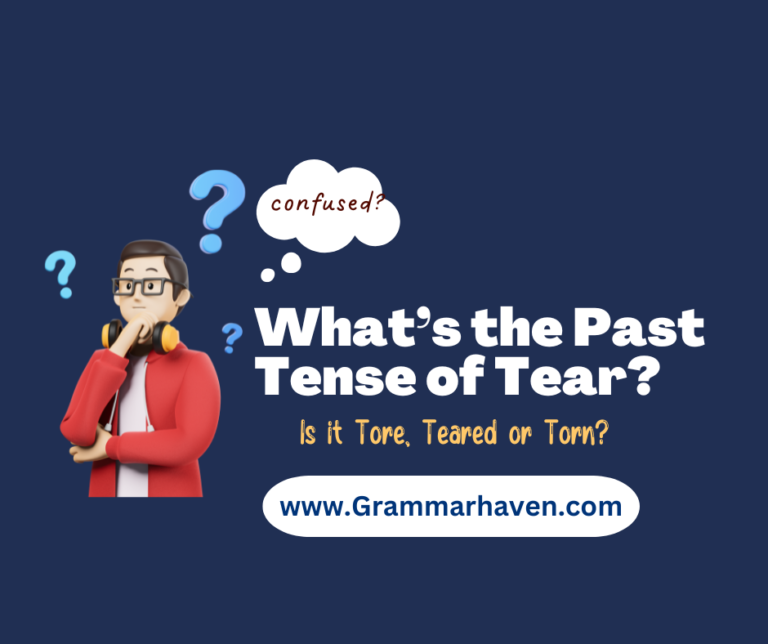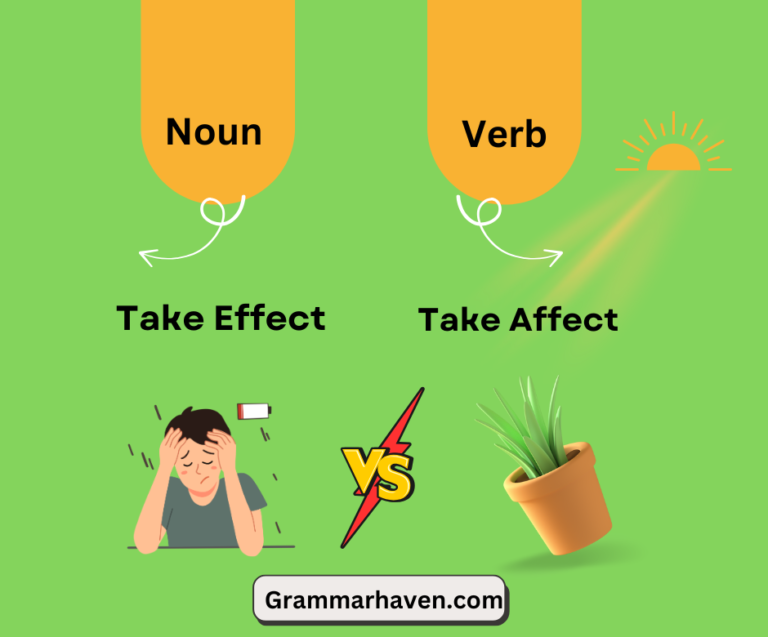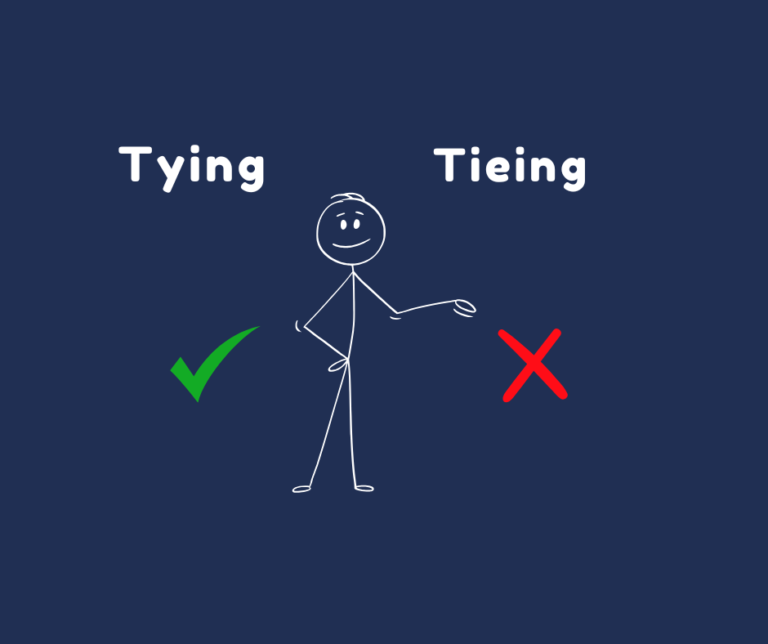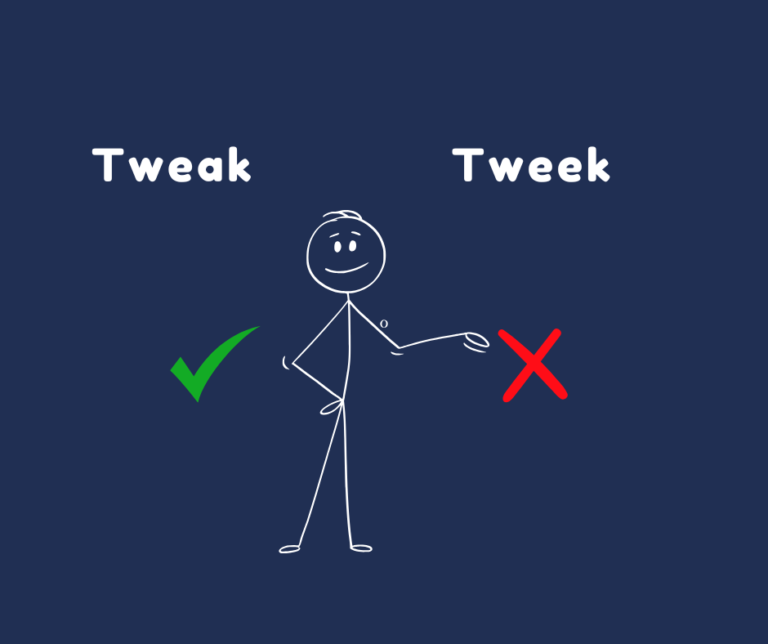Agreeance vs Agreement – Which One Should You Use?
Many people come across terms agreeance vs agreement and find it difficult to determine which one is correct, especially in formal writing. “Agreeance” means the “the act of agreeing,” while “agreement” means “mutual decision or contract between two or more people.”
At first glance, agreeance and agreement might seem interchangeable, but in reality, one is a widely accepted word in English, while the other is considered outdated and even incorrect in most contexts.
In this article, we will explore the meaning, usage, and history of both words, explain why agreeance has fallen out of favor, and help you understand when to use agreement in professional and everyday language.
What Do “Agreeance” and “Agreement” Mean?
Definition of Agreeance
“Agreeance” refers to “the act of agreeing.” While this definition might make it seem like a valid synonym for agreement, the reality is different.
Oxford English Dictionary (agreeance, n. meanings) .
Is agreeance a word?
Technically, yes, agreeance is a word but it is rarely used in modern English and in many dictionaries it is labeled as “nonstandard,” meaning it is not commonly recognized in formal writing.
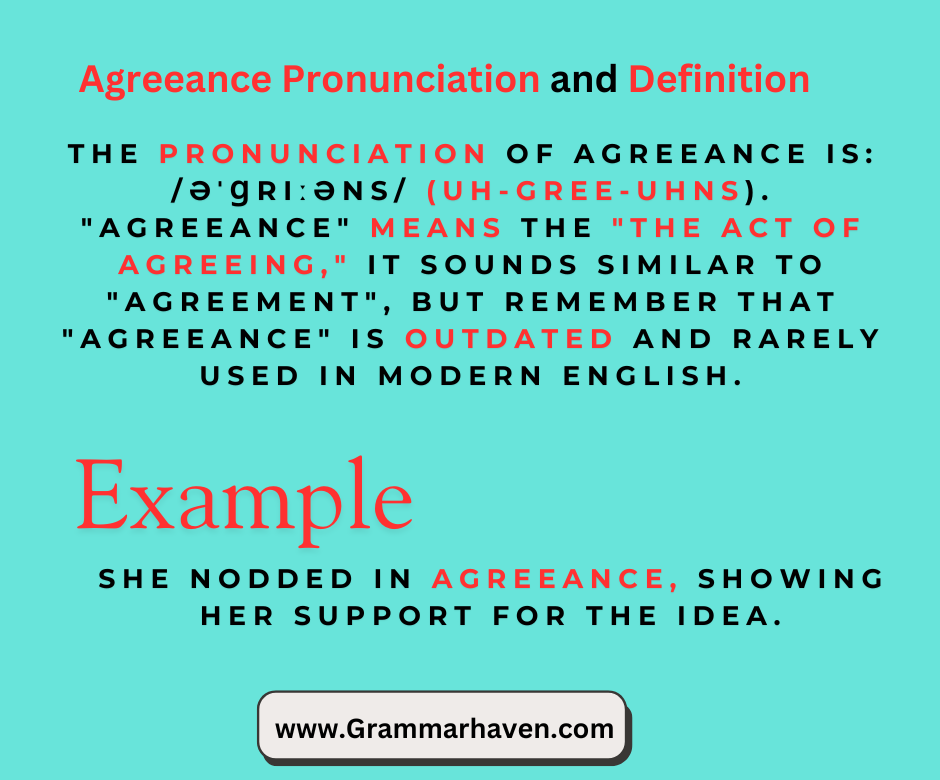
Definition of Agreement
“Agreement” is the standard noun form of the verb “agree” standard and widely accepted word in the English language, referring to a “mutual decision, contract, or shared understanding between two or more people.”
Unlike agreeance, agreement is used in legal documents, business contracts, and everyday conversations, making it the correct choice in almost all situations.
If you have to use agreeance vs. agreement in formal writing, always choose agreement to ensure clarity and professionalism.
When discussing proper word usage, it’s essential to consider verb forms as well. Just as “agreeance” is outdated compared to “agreement,” understanding verb tense differences, like “arised” vs. “arose,” ensures clarity and professionalism in writing.
Merriam-Webster (Agreement Definition & Meaning)
Is it I Agree or I am in Agreement?
Both “I agree” and “I am in agreement” are correct, but they are used in different contexts:
- “I agree” is more common, direct, and conversational. It’s the preferred choice in everyday speech and writing.
- Example: I agree with your opinion on this matter.
- Example: I agree with your opinion on this matter.
- “I am in agreement” sounds more formal and is often used in professional or academic settings. It emphasizes a state of mutual agreement.
- Example: The board members are in agreement on the new policy changes.
- Example: The board members are in agreement on the new policy changes.
For most situations, “I agree” is the better and more natural choice.
What is the difference between consent and agreement?
The key difference between consent and agreement lies in their meaning and usage:
Consent
- Definition: Consent refers to giving permission or approval for something to happen.
- Usage: It is often used in legal, medical, and ethical contexts where one party authorizes or allows an action.
- Example:
- The patient gave consent for the surgery.
- Parental consent is required for minors to participate in the study.
- The patient gave consent for the surgery.
Agreement
- Definition: Agreement refers to a mutual understanding or arrangement between two or more parties.
- Usage: It is used in general discussions, legal contracts, and business dealings where two or more parties reach a shared decision.
Example:
- The two companies reached an agreement on the terms of the contract.
- We are in agreement about the new office policy.
Key Differences Between Agreeance and Agreement
| Feature | Agreeance | Agreement |
| Definition | Act of agreeing (obsolete) | Mutual understanding, contract |
| Grammatical Use | Noun | Noun |
| Historical Use | Used in 16th-18th century English, now rare | Standard and widely used today |
| Dictionary Recognition | Considered nonstandard, archaic | Fully recognized in all dictionaries |
| Usage in Writing | May sound awkward or incorrect | Preferred in all forms of writing |
Should I use agreeance or agreement? Always go with agreement, as it is the correct and universally accepted term.
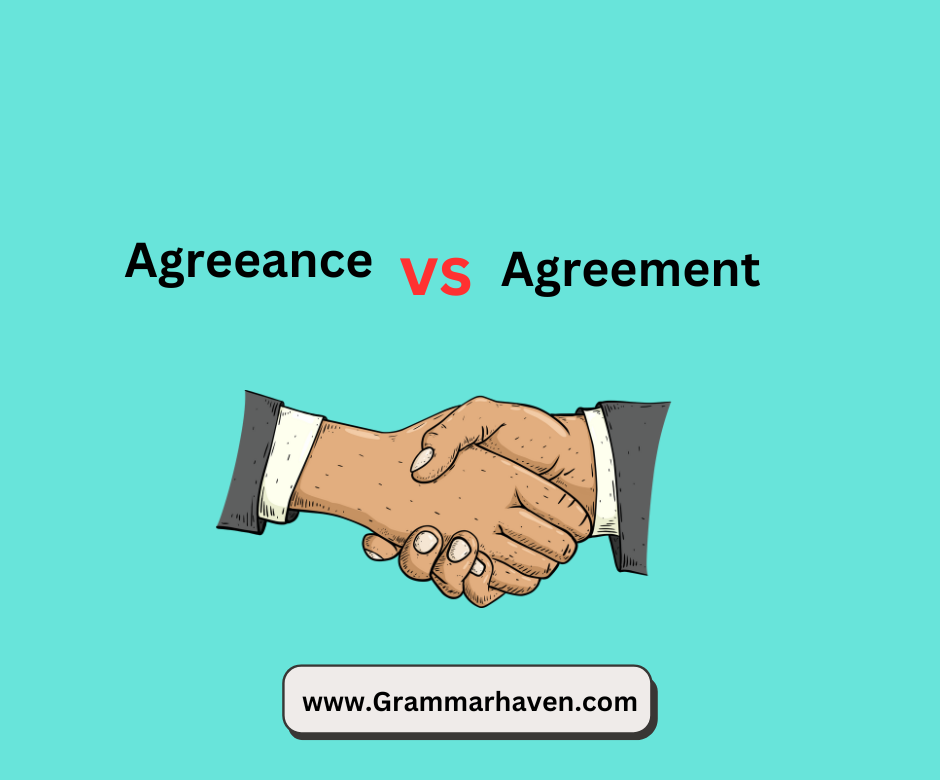
Is “Agreeance” a Proper Word in Modern English?
No, agreeance is not a proper word in english .
While agreeance was once used in English, it has fallen out of favor over time. Most modern dictionaries either exclude it entirely or mark it as outdated.
Even if you find agreeance in older texts, it is important to remember that language evolves. Just like words such as thou and thee have faded from common use, so has agreeance.
Is agreeance making a comeback? Unlikely. Most grammar experts recommend avoiding it in formal, academic, or business writing to maintain credibility.
Agreeance pronunciation
The pronunciation of agreeance is: /əˈɡriːəns/ (uh-GREE-uhns). It sounds similar to “agreement”, but remember that “agreeance” is outdated and rarely used in modern English. It’s always better to use “agreement” instead.
Does agreeance exist in legal documents?
No, agreement is the proper legal term.
Is Agreeance obsolete?
Yes, “agreeance” is considered obsolete and outdated in modern English. While it was occasionally used in the past, “agreement” has always been the preferred and widely accepted term. Today, “agreeance” is rarely used in professional, academic, or formal writing, and many consider it incorrect or unnecessary. To ensure clarity and professionalism, it’s best to use “agreement.”
Why do Australians say Agreeance?
Australians occasionally use “agreeance”, but it is not a standard or widely accepted term even in Australian English. The reason some Australians might say “agreeance” could be due to historical usage, regional language habits, or influence from older legal and governmental documents where the word appeared.
However, even in Australia, “agreement” remains the correct and preferred term in formal writing and professional communication. While you may hear “agreeance” in casual conversations, it is generally considered outdated or unnecessary in modern English.
Historical Evolution: Why “Agreeance” Faded Away
Many people are surprised to learn that agreeance was actually used in English centuries ago. However, as the language evolved, agreement became the dominant term.
The Decline of “Agreeance”
- Used in Shakespearean and Old English literature (16th-17th century)
- Began disappearing in the 18th century
- By the 19th and 20th centuries, “agreement” had fully replaced it
Why did agreement replace agreeance? It was simpler, clearer, and preferred by writers and speakers.
Examples of Agreement in sentences
Agreement (Correct and Widely Used)
- The business partners signed an agreement to finalize their collaboration.
- They came to an agreement on the best way to handle the project deadline.
- Her speech was in full agreement with the company’s vision for the future.
- The landlord and tenant reached an agreement regarding the lease extension.
- Our team members are in agreement about implementing the new marketing strategy.
Examples of Agreeance in sentences
Agreeance (Outdated and Rarely Used)
- The committee was in agreeance on the proposed budget changes, though the term is now considered old-fashioned.
- She nodded in agreeance, showing her support for the idea.
- The council members expressed their agreeance before voting on the policy.
- While many were in agreeance with the leader’s decision, others had reservations.
- The term “agreeance” is rarely used today, as “agreement” is the preferred choice in professional writing.
What is synonym in agreeance?
Since “agreeance” is an outdated and rarely used word, the best synonym would be “agreement”, which is the correct and widely accepted term.
Other synonyms depending on the context include:
- Accord
- Consensus
- Harmony
- Unanimity
- Understanding
For example:
- We are in agreement on the new policy. (Preferred)
- We are in agreeance on the new policy. (Outdated)
It’s always best to use “agreement” instead of “agreeance” for clarity and professionalism.
Formal vs. Informal Usage: When to Use Each Term
Since agreeance is considered nonstandard, it should be avoided in all formal contexts.
Correct Usage in Different Settings
- Business & Legal Writing → Always use agreement
- Professional Emails & Reports → Use agreement
- Academic Essays & Research Papers → Agreement is the only correct choice
- Casual Conversations or Creative Writing? → Agreeance might be acceptable, but still uncommon
Examples of Correct and Incorrect Usage
Incorrect: They finally came to an agreeance on the contract.
Correct: They finally reached an agreement on the contract.
Incorrect: Our team was in agreeance about the new policy.
Correct: Our team was in agreement about the new policy.
How do I remember the difference? Just remember: “Agreement” is always the right choice!
Expert Opinion: What Do Linguists Say About Agreeance?
Linguists and grammar experts agree that “agreeance” should not be used in professional writing.
According to Oxford English Dictionary:
- Agreeance is considered outdated and archaic.
- Agreement is the only proper modern English term.
Merriam-Webster’s stance on agreeance:
- Not commonly used
- Marked as nonstandard
Grammarly & Language Experts:
- Using agreeance may confuse readers or make writing sound unpolished.
Conclusion: What Should You Use?
If you’re still wondering whether to use “agreeance” vs “agreement,” the answer is simple: always choose “agreement.” It is the correct and widely accepted term in both formal and informal writing. Using “agreement” ensures clarity, professionalism, and credibility in your communication. On the other hand, “agreeance” is outdated and rarely used in modern English, making it unsuitable for professional or academic writing. To maintain a polished and authoritative tone, it is best to stick with “agreement.”
Sources:
Wikipedia (agreeance – Wiktionary, the free dictionary) and Etymonline (Etymology of agreement by etymonline).

